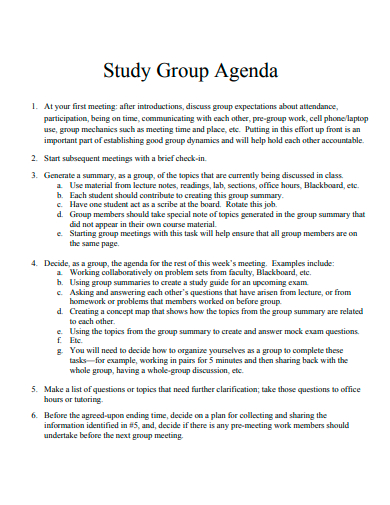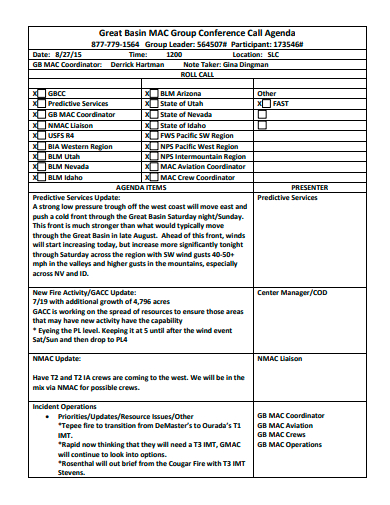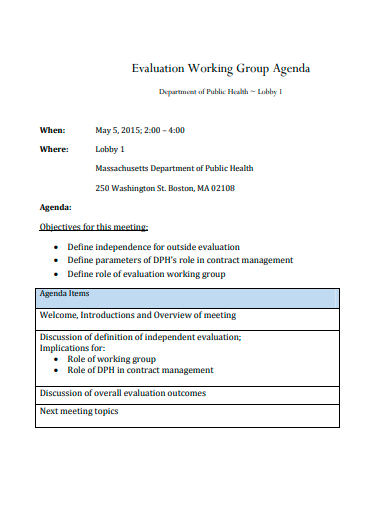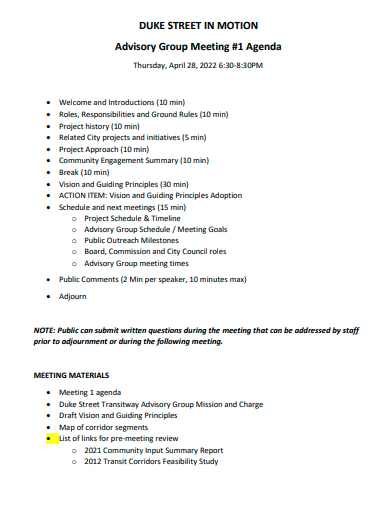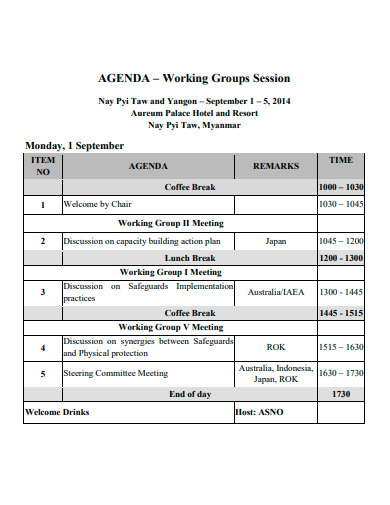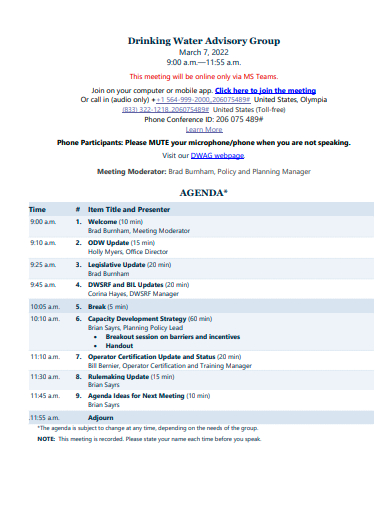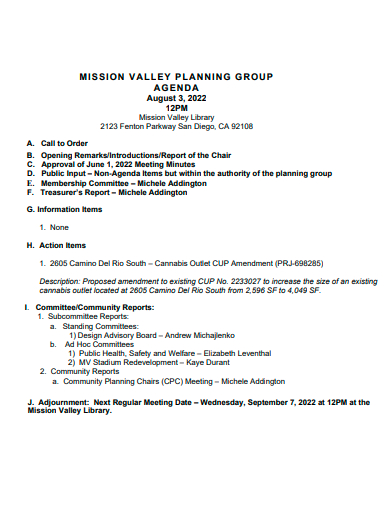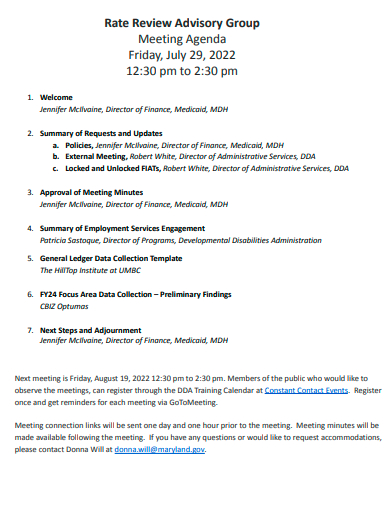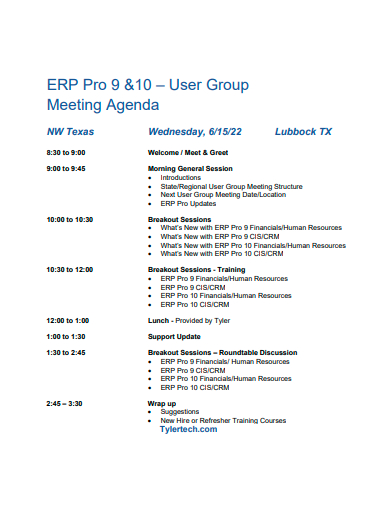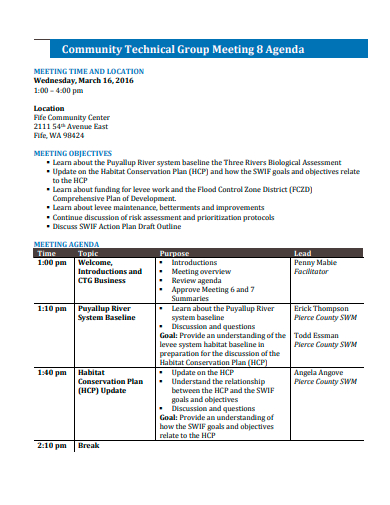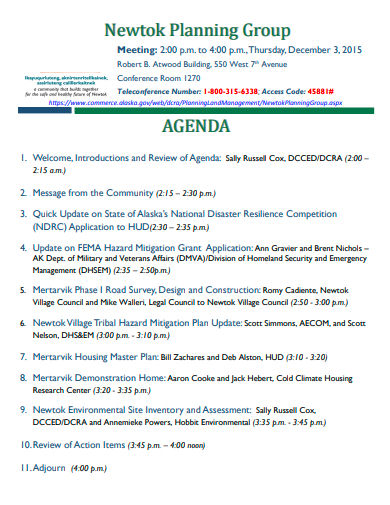In spite of the fact that business meetings are an essential component of effective team collaboration, we have all participated in gatherings that were a complete and utter waste of everyone’s time. The participants would show there without having done any prior preparation, the conversation would go off subject, and several hours would pass before any conclusions were reached. Your team will be able to enter your meeting or standup with passion, self-assurance, and lots of things to say if you have prepared the appropriate group agenda for your meeting. It is a strong tool that will assist you in running meetings that are productive, engaging, and have an impact. Here is a group meeting agenda that you can use to help inspire interesting conversations, whether you are a general manager leading your first team meeting or a seasoned veteran trying to liven up your existing meetings.
FREE 10+ Group Agenda Samples
1. Study Group Agenda
2. Group Conference Call Agenda
3. Evaluation Working Group Agenda
4. Advisory Group Meeting Agenda
5. Working Groups Session Agenda
6. Drinking Water Advisory Group Agenda
7. Planning Group Agenda
8. Rate Review Advisory Meeting Group Agenda
9. User Group Meeting Agenda
10. Community Technical Group Meeting Agenda
11. Network Planning Group Agenda
What Is a Group Agenda?
An important document that contains the specific specifics of a company meeting is referred to as a group agenda. Whether it be for a cooperative firm that deals in real estate, a recruiting agency, or another type of business. In addition, the attendees of a meeting should be informed by the agenda of what to anticipate during the meeting and how they can best prepare for it. This information should include both what to anticipate during the meeting and how they can best prepare for it. In addition, agendas assist you to make better use of your time by segmenting the meeting into various topics and assigning a predefined amount of time to cover each of those concerns. This allows you to maximize the efficiency with which you use the time you have available.
How To Make a Group Agenda?
The agenda for the team meeting should be distributed to your sales team as well as any other teams that will be attending the meeting well in advance of the meeting date. In this sense, individuals will be able to both prepare talking points and updates, as well as reflect on what it is that they desire to say. You can begin the process of putting together your schedule by following the steps that are detailed in the following paragraphs.
Step 1- Determine The Goals
Take a moment to give some thought to the following question: what, precisely, is the purpose of the meeting that you are going to be organizing? Is it to make the exchange of information more easy? to think of something completely original? in order to come up with a response to a problem that has been posed? It is possible for the setting of an aim for a meeting to make both the purpose of the meeting and the outcomes that are planned for the meeting extremely clear.
Step 2- List and Organize Agenda
Even if a meeting has been meticulously prepared for and communicated in advance, there is no assurance that those who attend will have a great experience while they are there. In place of the agenda itself, the focus should be on the things on the agenda, which are also referred to as the agenda items, and what is pertinent and essential about those issues. They are the crucial component that, if managed correctly, may give the gathering a natural flow and make it more enjoyable for everyone.
Step 3- Be Specific
Take a moment to give some thought to the following question: “Which issues are definitely necessary to be discussed during the meeting?” You should make an effort to be as specific as possible, and you should commit a certain amount of time to each issue. When it comes to the items that are on the agenda, being explicit helps guarantee that those who are there understand the problem or the challenge.
Step 4- List Your Priorities
Things that are brought up early in the agenda are given more time and attention over the course of the whole meeting. This brings us to the next piece of advice for how to design an agenda for a meeting, which is to discuss the most significant questions you have at the beginning of the meeting, as this is the natural segue from the previous point. You will make it a point to cover all of the significant themes, regardless of whether or not you have enough time to do so.
What are the goals of holding a meeting with the team?
At its most fundamental level, the objective of a team meeting is to facilitate the smooth exchange of information between members of the team while also allowing for ample opportunity for conversation regarding the material that is being exchanged.
What should you introduce yourselves and your team with when you finally get together for the first time?
Show them the kind of environment you want to encourage inside the team by setting an example for them. During the course of your meeting, you should not only inform attendees on the relevance of collaborative intelligence in the workplace, but you should also set a good example for them to follow.
What exactly are the three parts that comprise an agenda, and what do they consist of?
Information that is fundamental, such as the location of the meeting, the names of individuals who are expected to attend, the date, the beginning and ending times, and other relevant details, etc.
Related Posts
FREE 10+ Team Agenda Samples in PDF | DOC
FREE 10+ Client Meeting Agenda Samples in MS Word | Pages | Google Docs | PDF
FREE 10+ Strategy Meeting Agenda Samples in PDF
FREE 10+ Family Meeting Agenda Samples in PDF
FREE 10+ Day Agenda Samples in MS Word | Pages | Google Docs | PDF
FREE 10+ Program Agenda Samples in PDF
FREE 10+ Committee Meeting Agenda Samples in MS Word | Pages | Google Docs | PDF
FREE 6+ Wedding Agenda Samples in MS Word | PDF
FREE 10+ Retreat Agenda Templates in PDF | MS Word
FREE 18+ Safety Agenda Samples & Templates in MS Word | PDF
FREE 10+ Board Agenda Samples & Templates in PDF | MS Word
FREE 10+ Interview Agenda Samples and Templates in PDF | MS Word
FREE 7+ Travel Agenda Samples and Templates in PDF
FREE 10+ Project Agenda Samples and Templates in PDF | MS Word
FREE 12+ Sales Agenda Templates in PDF | MS Word

